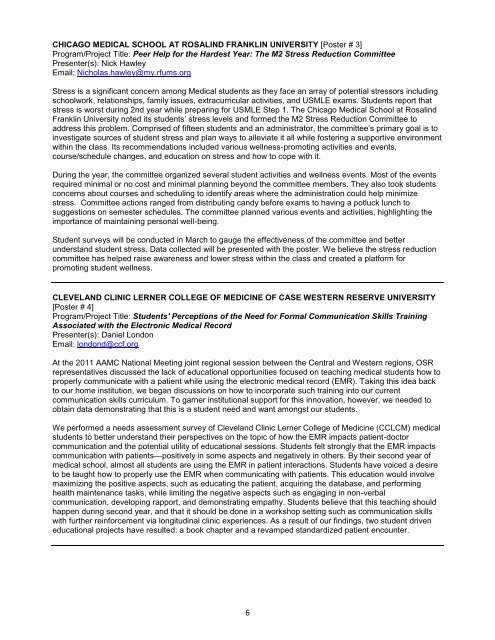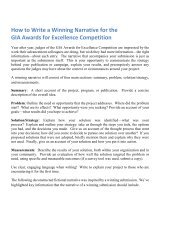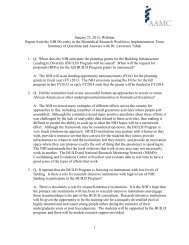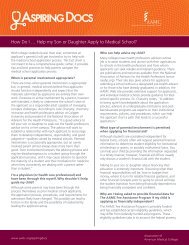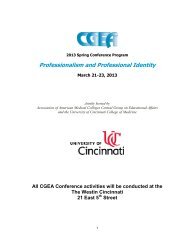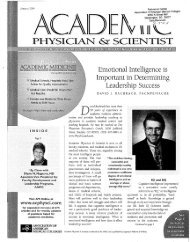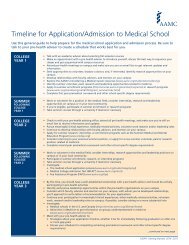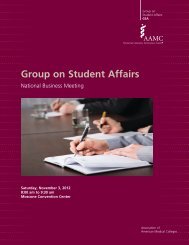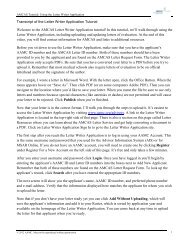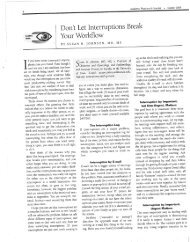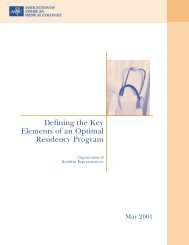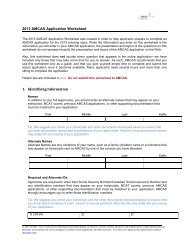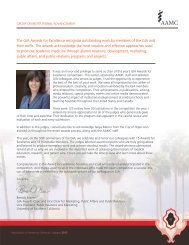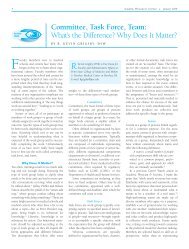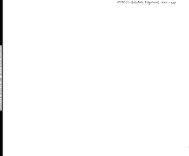2013 Poster Session Summaries - AAMC
2013 Poster Session Summaries - AAMC
2013 Poster Session Summaries - AAMC
You also want an ePaper? Increase the reach of your titles
YUMPU automatically turns print PDFs into web optimized ePapers that Google loves.
CHICAGO MEDICAL SCHOOL AT ROSALIND FRANKLIN UNIVERSITY [<strong>Poster</strong> # 3]<br />
Program/Project Title: Peer Help for the Hardest Year: The M2 Stress Reduction Committee<br />
Presenter(s): Nick Hawley<br />
Email: Nicholas.hawley@my.rfums.org<br />
Stress is a significant concern among Medical students as they face an array of potential stressors including<br />
schoolwork, relationships, family issues, extracurricular activities, and USMLE exams. Students report that<br />
stress is worst during 2nd year while preparing for USMLE Step 1. The Chicago Medical School at Rosalind<br />
Franklin University noted its students’ stress levels and formed the M2 Stress Reduction Committee to<br />
address this problem. Comprised of fifteen students and an administrator, the committee’s primary goal is to<br />
investigate sources of student stress and plan ways to alleviate it all while fostering a supportive environment<br />
within the class. Its recommendations included various wellness-promoting activities and events,<br />
course/schedule changes, and education on stress and how to cope with it.<br />
During the year, the committee organized several student activities and wellness events. Most of the events<br />
required minimal or no cost and minimal planning beyond the committee members. They also took students<br />
concerns about courses and scheduling to identify areas where the administration could help minimize<br />
stress. Committee actions ranged from distributing candy before exams to having a potluck lunch to<br />
suggestions on semester schedules. The committee planned various events and activities, highlighting the<br />
importance of maintaining personal well-being.<br />
Student surveys will be conducted in March to gauge the effectiveness of the committee and better<br />
understand student stress. Data collected will be presented with the poster. We believe the stress reduction<br />
committee has helped raise awareness and lower stress within the class and created a platform for<br />
promoting student wellness.<br />
CLEVELAND CLINIC LERNER COLLEGE OF MEDICINE OF CASE WESTERN RESERVE UNIVERSITY<br />
[<strong>Poster</strong> # 4]<br />
Program/Project Title: Students' Perceptions of the Need for Formal Communication Skills Training<br />
Associated with the Electronic Medical Record<br />
Presenter(s): Daniel London<br />
Email: londond@ccf.org<br />
At the 2011 <strong>AAMC</strong> National Meeting joint regional session between the Central and Western regions, OSR<br />
representatives discussed the lack of educational opportunities focused on teaching medical students how to<br />
properly communicate with a patient while using the electronic medical record (EMR). Taking this idea back<br />
to our home institution, we began discussions on how to incorporate such training into our current<br />
communication skills curriculum. To garner institutional support for this innovation, however, we needed to<br />
obtain data demonstrating that this is a student need and want amongst our students.<br />
We performed a needs assessment survey of Cleveland Clinic Lerner College of Medicine (CCLCM) medical<br />
students to better understand their perspectives on the topic of how the EMR impacts patient-doctor<br />
communication and the potential utility of educational sessions. Students felt strongly that the EMR impacts<br />
communication with patients—positively in some aspects and negatively in others. By their second year of<br />
medical school, almost all students are using the EMR in patient interactions. Students have voiced a desire<br />
to be taught how to properly use the EMR when communicating with patients. This education would involve<br />
maximizing the positive aspects, such as educating the patient, acquiring the database, and performing<br />
health maintenance tasks, while limiting the negative aspects such as engaging in non-verbal<br />
communication, developing rapport, and demonstrating empathy. Students believe that this teaching should<br />
happen during second year, and that it should be done in a workshop setting such as communication skills<br />
with further reinforcement via longitudinal clinic experiences. As a result of our findings, two student driven<br />
educational projects have resulted: a book chapter and a revamped standardized patient encounter.<br />
6


